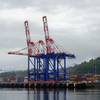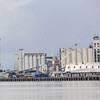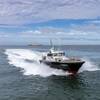While seaports that handle ocean-going ships often garner headlines for their security and environmental programs, and cargo and passenger handling news, the role and benefits of the world’s vast inland waterway systems are not as well known. However, shallow-draft waterways and ports, which primarily accommodate towboats, barges, pleasure craft and touring vessels, are an integral part of a nation’s maritime system and serve as an economic and jobs generator. With its inaugural Shallow-Draft Ports seminar slated for the Sheraton Station Square Hotel in Pittsburgh, Pa., on Oct. 5-6, the American Association of Port Authorities (AAPA) hopes to improve the maritime industry’s understanding of inland waterways and ports, and point out ways to better utilize them.
“The seminar’s theme, ‘Connecting the Ports for Success,’ aptly describes the program’s goal of raising awareness of the benefits to be gained by linking deep- and shallow-draft ports and carriers, and seeking new ways to partner and grow,” said AAPA President and CEO, Kurt Nagle. “As much as America depends on its coastal and Great Lakes seaports to handle international cargo, our system of inland waterways and ports provides a critical connection to ensure that goods can move domestically in the most economical way possible with the least impacts to the environment.”
According to R. Barry Palmer, president and CEO of Waterways Council Inc. (WCI), America’s inland and coastal waterways system moves more than $312 billion in domestic cargo and ships more than 1 billion tons of grain, coal, steel, petroleum products and aggregate materials a year. “The barge and towing industry adds $5 billion annually to the U.S. economy, carrying 15 percent of the nation’s commerce for just 2 percent of the freight bill,” he said.
WCI is a national public policy organization which advocates for a modern and well-maintained system of ports and inland waterways. Palmer notes that inland waterways relieve traffic congestion on already over-crowded highways and railways, and reduce air pollution because they use barges that can carry 60 times more freight than semi-trucks on the equivalent amount of fuel.
Similarly, Tom Allegretti, president and CEO of the American Waterways Operators (AWO)—the national trade association for the U.S. tugboat, towboat and barge industry—said AWO member companies move more than 800 million tons of cargo annually. He said these companies provide a safe, economical and environmentally-friendly means of transporting petroleum and coal products to satisfy America’s energy needs, while giving farmers and miners an effective way to stay competitive with foreign producers in the global market.
In agreeing to accept an amendment on the floor of the House in July to help fund dredging needs at harbors handling less than 1 million annual tons of cargo, Congressman John J. Duncan (R-TN), chairman of the House Water Resources and Environment Subcommittee, said that two-thirds of all cargo moved on major waterways either start or finish at small ports. “If we abandon our small harbors, we adversely affect the entire waterway system,” he emphasized.
At AAPA’s Shallow-Draft Ports seminar, sessions will include topics such as, “Connecting to the Inland Freight System,” “Port-to-Port Marketing Strategies,” “Satisfying the Infrastructure Needs of Inland Ports,” “Short Sea Shipping Opportunities,” “International Operations of Shallow-Draft Ports,” and a look at the industry’s anticipated future growth, fleet scenarios and cargo transshipment opportunities. The seminar will also cover business and partnering opportunities for AAPA members and others in the maritime industry throughout the Western Hemisphere.
The AAPA program will follow and complement the SmartRivers 21 Conference and Symposium on Inland Navigation, to be held Oct. 3-5 in the same location. The Shallow-Draft Ports seminar will begin the evening of Oct. 4 with a welcome reception in the Sheraton Station Square Hotel.
Featured videos

Tracking Foreign Vessels Working in the U.S. Jones Act Market

Inmarsat Enhances Service to Drive Digitalization

Unlock Onboard Data Efficiencies
Subscribe for
Maritime Reporter E-News
Maritime Reporter E-News is the maritime industry's largest circulation and most authoritative ENews Service, delivered to your Email five times per week









